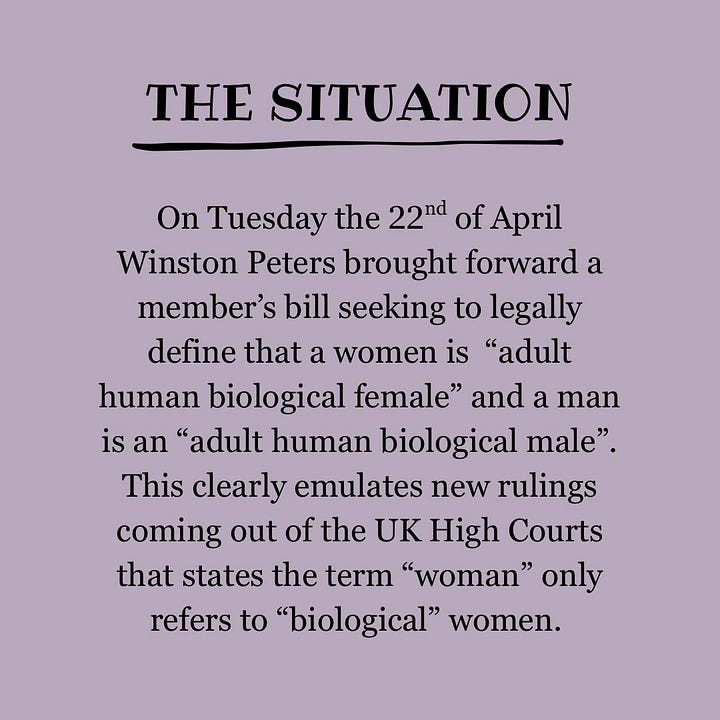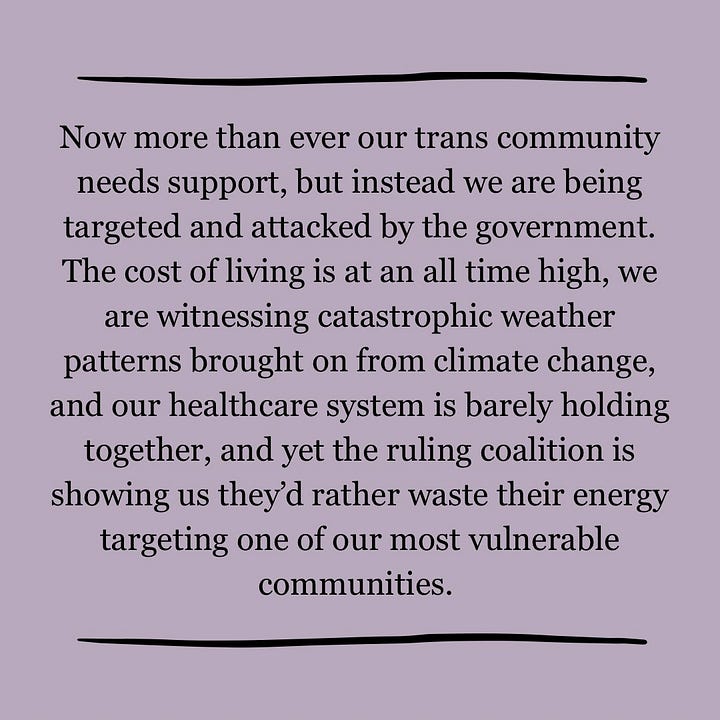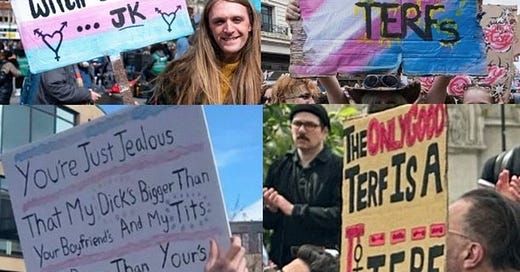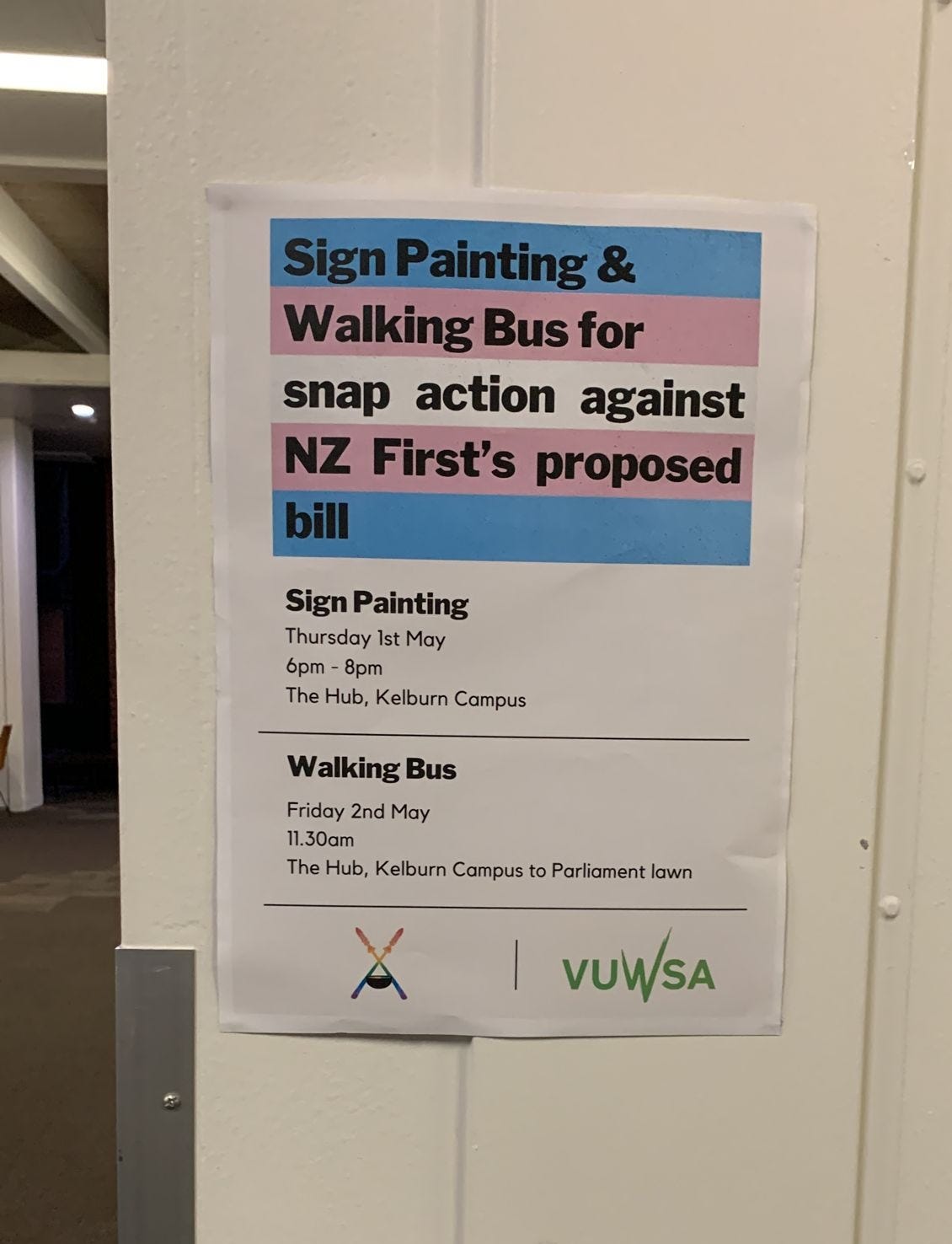The last whirlwindy fortnight
A directive to use female-centric language, the UK Supreme Court Ruling, a Bill to define sex, and an outbreak of outrage at women's rights.
It’s been quite the two weeks. Here’s a rundown of how big sex and gender news went down in Aotearoa NZ. It’s long, but I want to record it all for posterity.
Tuesday 15 April—The Costello Directive & responses
The news breaks that on March 27th, Associate Health Minister Casey Costello had written to Health NZ telling them to call pregnant women pregnant women rather than pregnant people. She also mentioned other phrases she objects to including “people with cervixes” and “individuals capable of childbearing”. In the letter Costello says:
"It is important that we have clarity about the people we are referring to when talking about women's health. Sex-specific language ensures that women know what health services they are entitled to and can access these easily, especially for those women with English as a second language."
"Clear language should be used in all documents and communications that refer to health issues specific to females."
RNZ covers the story. The article does give a variety of perspectives, but it is researcher George Parker’s position that is used for the pull quote and frames the article: “Roadblocking the use of inclusive language”. Parker says that what Costello has suggested is not “best practice”.
Madeleine Chapman, editor of The SpinOff, writes A deeply frustrating line-by-line reading of Casey Costello’s letter to Health NZ. Chapman writes ‘“Sex-specific language” would mean only referring to patients as males or females, which I’m not sure has ever been done?’ Hmm, really Madeleine? Doctors not referring to people’s sex?
Chapman goes on to complain about the conflation of sex and gender, says that the phrase “people with a cervix” is specific and medically appropriate for a healthcare setting, proposes that not wanting woman to be referred to as “people with cervixes” is the equivalent of referring to female reproductive organs as “down there”. She suggests that “woman” is a social construct, that gender and sex, and woman and female, are different things and Costello doesn’t understand this basic difference.
In an RNZ interview, Labour leader Chris Hipkins says, “Frankly I’m surprised the minister is giving this her time when there are many, many more important things I would have thought she should be worrying about.” Hipkins makes no mention of the clear evidence that Health NZ staff members have been playing a time-consuming game of Taboo that involves talking about women’s health without using the word women.
An RNZ article has The College of Midwives saying that Health NZ can keep using the term “pregnant women” without excluding trans people. Praise be! Jaime Veale, director of the Transgender Healthcare Lab at Waikato University, disagrees.
Speak Up for Women and the Women’s Right Party agree.
Speak Up for Women’s press release says:
“Language matters—especially in health. When we stop naming a group who are impacted, we remove their voice from discussions that affect them.”
The Women’s Rights Party’s press release says:
The issue that Minister Costello is addressing is the language around women’s reproductive health, which has been weaponised to advance the visibility of a particular group, and not the health and wellbeing of all women.
Jan Rivers from Genspect releases an opinion piece about it all. She describes how George Parker and the Health Research Council have received significant money for research on maternity services for trans people. George Parker’s research was meant to involve 15-20 transmen who had given birth over 3 years, but settled on 11 people over 6 years and a much broader scope of eligibility than in the original proposal. There just weren’t enough people. By comparison, about 60,000 women give birth every year. Incredible that Health NZ is so enamoured of Parker-style arguments that 60,000 women a year had to suffer unclear, degrading language that denies the sexed nature of their experience and all to appease 1 or 2 pregnant people who don’t identify as women.
Wednesday 16 April—The Supreme Court ruling
At around 9pm NZ time, the UK’s Supreme Court announces its ruling on For Women Scotland Ltd (Appellant) v The Scottish Ministers (Respondent). The case was heard in November and focused on whether the term sex in the UK Equalities Act 2010 refers to biological sex and whether woman refers to biological women or also includes males with or without a gender recognition certificate.
The Supreme Court unanimously rules that sex is biological and the special protections for women are for those born female. It also makes notes that the Equality Act retains protections trans people under a separate clause. Special mention is made of the importance for lesbians of biological definitions of sex in law. Its main point is that sex-based protections are meaningless without a coherent definition of sex.
“Interpreting “sex” as certificated sex would cut across the definitions of “man” and “woman” and thus the protected characteristic of sex in an incoherent way. It would create heterogeneous groupings. As a matter of ordinary language, the provisions relating to sex discrimination, and especially those relating to pregnancy and maternity (sections 13(6), 17 and 18), and to protection from risks specifically affecting women (Schedule 22, paragraph 2), can only be interpreted as referring to biological sex (paras 172, 177-188).
Thursday 17 April—NZ coverage of the UK Supreme Court ruling
Multiple NZ mainstream news outlets cover the Supreme Court ruling. Given the near media black out on any perspectives other than women can have penises, this is quite a breakthrough.
Stuff publishes How did the UK Supreme Court define a woman, and what happens now? (from AP).
RNZ publishes In landmark ruling, UK's top court says legal definition of woman refers to biological sex (from Reuters).
TVNZ runs AP’s UK's top court says definition of a woman is based on biological sex, and breaking a long tradition of denying a voice to feminist women who critique gender ideology, Jill Ovens of the Women’s Rights Party appears on the 6pm News.
Friday 18 April—News flash: a NZ mainstream media article focuses on women’s rights
Ahoy there! An opinion piece that focuses on women’s rights when discussing the Supreme Court ruling on, well, women’s rights.
The NZ Herald publishes opinion from Fran Sullivan: Why UK Supreme Court decision matters for women’s rights. Sullivan quotes co-director of For Women Scotland, Susan Smith.
“This is not about prejudice or bigotry, as some people would say, it’s not about hatred for another community. It’s just about saying that there are differences, and biology is one of those differences, and we just need protections based on that.”
Saturday 19-Sunday 20 April-The British Let Us Pee lads show their true colours
Gender activists protest the Supreme Court ruling in London and other centres. Statues, including that of suffragette Millicent Fawcett, are vandalised. Among trans rights now placards are placards promoting the return of witch burning and inciting violence against feminists.
Tuesday 22 April—A new NZ Bill to define women and men!
NZ First introduces a proposed Members’ Bill to define woman and man in law. Proposed Members Bills are generally selected by ballot so it might not make it on a path to legislation. Of the Bill, NZ First leader Winston Peters says:
“Our laws should reflect biological reality and provide legal certainty”.
These definitions in law fight back against the cancerous social engineering we’ve seen being pushed in society by a woke minority”.
The need for legislation like this shows how far the deluded left has taken us as a society. But we are fighting back”, says Mr Peters.
“This bill is a win for common sense.”
Speak Up for Women issues a press release saying it welcomes both the Supreme Court ruling and the new Bill.
“As Minister for Women, Nicola Grigg has a responsibility to stand up for the rights, safety and dignity of women and girls,” said [Suzanne] Levy. “We urge her to publicly support the UK ruling and the proposed legislative changes here in New Zealand that recognise the reality of biological sex.”
“We welcome political support for clarifying biological definitions to legislation,” said Levy. “This is not about being anti-anyone — it’s about ensuring the rights of women and girls are protected in law.”
Roger Partridge, chair and senior fellow of The New Zealand Initiative, publishes an opinion piece in Law News: Statutory interpretation: the UK Supreme Court shows how it’s done. Partridge’s main point is that the Supreme Court has interpreted sex in the Equalities Act 2010 as it was intended at the time of writing.
Wednesday 23 April—An interview with Peters gets messy, Thistoll chimes in
Stuff publishes UK PM changes stance, says trans women are not women, after Supreme Court ruling.
On RNZ Corin Dann interviews Winston Peters about the proposed Bill. Peters is hostile from the outset. When asked by Dann how he feels that it was a NZ First MP who first put forward the Bill, Peters says (incorrectly) that Tracey Martin (at the time a NZ First MP) ushered through self-identification laws “behind our back”. Peters objects to Dann’s interview style accusing him of talking too much and presenting the woke view. Winston falls for the ‘will they be tested before going into the bathroom” gambit and says yes, allowing Dann to have a field day. Peters threatens to cut off RNZ funding.
Tracey Martin corrects him by Facebook video later that day. In 2017, when the Births, Deaths, Marriages, and Relationships Registration Bill returned from the Select Committee it had a self-ID clause that had been inserted after public submissions had closed. Tracey Martin, then Minister of Internal Affairs, in fact, defers the Bill over a concern that the controversial clause had not been put up for public discussion. It did not come back to the house until after Martin was no longer Minister of Internal Affairs.
In an RNZ story later that day, RNZ defends Dann’s behaviour as professional during the interview despite Peters’ attacks. Labour calls for the reprimand of Peters by the PM for threatening RNZ’s funding during the interview and David Seymour, ACT leader says that funding is not Peters call anyway.
Never insightful Paul Thistoll argues in The Spinoff that defining women as biological makes “no legal or human sense” and goes on to, in traditional Thistollian fashion, make stuff up. More on that later. Thistoll also leans into the phrase biological essentialism. Biological essentialism, in case you’re wondering, means understanding sex is biological in nature. The phrase “biological essentialism” can generally be replaced with “facts”. Stating that an arm is not a leg would, as far as I can tell, also count as biological essentialism. It’s fascinating to see the anti-science, anti-evolution propaganda machine in action. We see the phrase ‘biological essentialism’ as well as ‘imported culture war’ turn up multiple times as the days roll on.
“The implications of this decision are significant: it entrenches biological essentialism into the heart of UK anti-discrimination law.”
At some point NZ Women’s Refuge, cited approvingly by Thistoll as being explicitly trans-inclusive, reposts Thistoll’s article on Facebook. By the 30th of April, the post has been taken down.
Thursday 24 April—Luxon, Swarbrick, Gordon Campbell, chime in. Peters goes on conservative Christian radio show
PM Luxon says he won’t intervene after Peter’s threats.
On the Bill, Green co-leader Chloe Swarbrick says Peters is importing a culture war to distract from the real issues. With revolutionary fervour, Swarbrick deftly confuses defining oneself based on biology with reducing oneself to one’s biology:
“I come from a strong proud feminist tradition that rejects biological essentialism. I am not my womb. I am more than my womb and some women have had hyerectomies. There is more to people than our private parts but once again what we’re talking about is not a real problem.”
Swarbrick’s feminism appears to be the kind where women aren’t involved, and it’s a bit crude to talk about us or our bodies.
Meanwhile, in the latest of his regular commentaries, usually insightful journalist Gordon Campbell, tows a familiar line. In discussing the Supreme Court ruling and the NZ First Bill, Campbell ignores the clear benefits to women of having their biological class and associated protections defined in law. Instead, he bypasses the little matter of women and their rights altogether and talks of Peter’s persecution of trans people. He says of the Bill:
“The goal being to marginalise trans and non-binary people (even more than they are already) from social life in general and from the nation’s sports fields and public restrooms in particular.”
Gender activists have, in fact, run such a successful campaign that education, health care, language, and government institutions have introduced dramatic policy changes in the name of a “vanishingly minor presence”. Police cars, bus stations, councils, ministry lanyards all sport trans branding. Despite the stronghold over Wellington and the brains of many of the once decent thinkers, Campbell persists with tired rhetoric that says trans people are marginalised.
“Winston Peters is making political gains out of stoking fear and resentment against what is already the most vulnerable community in our society.”
Peters may be simply seizing an opportunity for the kind of political drama he relishes, but it’s a pity Campbell fails to investigate why such a move might be canny and extremely popular.
Winston Peters does an interview with Bob McCroskie, leader of conservative Christian group Family First. As well as the Bill, the conversation turns to Swarbrick’s defence of fellow Green MP Benjamin’s Doyle use of the word bussy on his social media posts An instagram album of Doyle’s included a photo of a child and was called “Bussy Galore”. While the term is a conflation of the words boy and pussy, Swarbric defended Doyle and commented that it was harmless slang and common among the queer community.
Peters, addressing Chloe Swarbrick says “OK, Groomer”. Swarbrick was the first to coin the OK, Boomer phrase that later went viral. Peters and McCroskie appear to find the use of the slur funny.
The Royal Australian and New Zealand College of Psychiatrists issues a press statement: Psychiatrists reject proposed Member’s Bill targeting trans and gender-diverse New Zealanders. There is no mention of women’s rights, only perceived impacts on gender minorities.
Friday April 25th—Interim guidance released by the UK’s Equality and Human Rights’ Commission
In the wake of the Supreme Court ruling the UK’s Equality and Human Rights’ Commission’s releases interim guidance. It says that workplaces and schools must provide single-sex facilities, should, in addition, where possible, provide mixed sex facilities and lesbians, gays, men and women may meet by themselves. The guidance provokes further outrage about the confirmation that women may exercise autonomy.
Saturday April 26th—Ex-Labour MP Louisa Wall chimes in
The Post publishes Trans people deserve safety, not exclusion by ex-Labour MP Louisa Wall. Wall writes of the Supreme Court ruling:
While celebrated by gender-critical advocates as a protection of women-only spaces, the decision has sparked concern over the erosion of transgender rights, highlighting how legal definitions can be weaponised to marginalise and exclude, with broader implications for human rights globally.
This isn’t an isolated incident—it’s part of a broader agenda: the weaponisation of gender identity for political gain, designed to provoke fear and divide communities. The narrative falsely pits “women’s rights” against “trans rights,” as if they are mutually exclusive. They are not.
Funny, then, with the false narrative and false pitting and all, that Wall thinks a ruling that upholds the protections for women must be declaimed as “regressive” and that such rights “undermine the rights and lived experience of transgender women”.
Sunday April 27th—Editor of The Post chimes in about SC, fairness and balance
Tracy Watkins editor of The Post writes: How a British court changed the debate over trans rights. She mentions earlier attempts to publish on the issue but that fear of backlash prevented her. She points to one article that was eventually run in 2021 by Charlie Mitchell an example of fairness and balance. While Mitchell refrained from calling feminists far right extremists, and touches on gender critical viewpoints, it’s mostly another trans activist fluff piece. Mitchell regurgitates without questioning it, the notion that everyone has a gender identity and is assigned sex at birth—a highly contested belief.
Monday April 28th—A Professor of Sociology and the YWCA (W optional) chime in & Jan Rivers calmly and methodically dismantles Thistoll
University of Waikato Professor of Sociology and Social Policy Katrina Roen announces, “the desire to define a woman is driven by the belief there are just two sexes, and that’s simply not the case” and then goes on to justify this by talking not about sex but about gender.
" Gender expression is something that can be explored throughout one’s lifetime. It doesn’t have to fit into a fixed category at all. It might change over the course of time.
“In terms of gender theory and research, since the 1970s, there’s been a very clear division between concepts of gender and sex.
“It’s often explained that gender relates to identity, how we identify, how we express ourselves. Gender roles might be a familiar concept. While sex relates to the sex body, sex anatomy, and sex characteristics. If we think of gender as social and sex as biological, that could be one way of understanding the difference,” she said.
The YWCA does a “We’re proudly for women—and that means all women.” post. YWCA too trembles in fear of “biological essentialism”.
Jan Rivers publishes an open letter to the editor of The Spinoff outlining errors in Paul Thistoll’s article. For example, here she takes on Thistoll’s assertion that it’s not sex discrimination at all kids, it’s gender discrimination. Doh.
The judgement’s (sic) essential mistake is to treat biology as the bedrock of human rights. But rights are grounded in how people live, how they are perceived and how they are treated. Gender is what drives discrimination. Gender is what shapes experience. And gender is what must underpin human rights protections.
False
Human Rights law related to sex is not based how people live or how they are perceived. Human Rights law on sex is now based in the inherent and indelible characteristic of sex. To say otherwise is deeply insulting. Men are responsible for most of the violent crime in society irrespective of how they “identify”. Women are not abused or raped based on their identity as women, or their stereotyped behaviour, but on their sex. I hope you would agree that women in Afghanistan are not kept in purdah because of their identities. Does the writer wonder why, if this were the case, they would not all identify as male and avoid their misfortunes?
And coming up?
Well, not to be outdone by their British brethren, Queer Endurance in Defiance, the group that brought you various Whatever You Do Don’t Let Women Speak rallies and the Puberty Blockers On Demand hikoi, are holding a snap protest in Wellington. To this group, a rational definition of women and men in law is the same as being targeted and attacked by the government. Interesting to note that the wording used in its flyer is almost identical to that used by Swarbrick.




Victoria University of Wellington Students’ Association, and Unions Wellington have pledged support. What a party. Whoop, whoop, down with biology, up with girly feelings, down with women having rights, freedoms and language.
NB: There’s been some amazing writing coming out of the UK on the Supreme Court ruling and local response. Perhaps my favourite so far is Victoria Smith’s blisteringly good Trans activism is Progressive Man’s manosphere.








Thank you for this roundup. I'd read quite a lot of it previously but it was good to have it compiled. I read through it all again, because I live in an ongoing state of disbelief about transgender activism and its success! So I read it to see if it's really that bad - and it is! I hadn't seen the Gordon Campbell piece previously, and this evoked one of my gasps. Haven't read him for a good while but always thought of him as sensible and someone who would stand by truth. That he has bought into the tired old story about trans vulnerability and victimisation is extremely disappointing. I really loved Victoria Smith's piece. I know I'm on the right side when I read her stuff, and yours, and all the other wonderful women who do see clearly, and speak it out.
Walls: “This isn’t an isolated incident—it’s part of a broader agenda: the weaponisation of gender identity for political gain…” Ffs - the genderborgs are the ones weaponising gender identity - we all had to state our “gender” in the last bloody census! No opt out for those of us who don’t believe we have a sexed soul. These people do my fcking head in with their gaslighting. The entire PMC, the media, academia, the arts, health and education sectors and more are captured by genderism but we are the baddies for refusing to nod along with the sexed-soul Thetan cult.